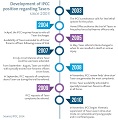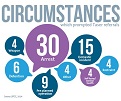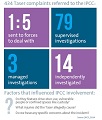Research and statistics
Police use of force | Taser | Overseeing the way police forces handle complaints | Deaths and serious injury | Mental health | Police corruption | Public confidence | Customer feedback
Police use of force
The IPCC has completed an in-depth study on police use of force drawing on evidence from complaints, IPCC cases and public perception. The study does not intend to provide a representative picture of how force is used nationally. However, it does identify some issues that emerge from the evidence available.
Taser
Since our launch in 2004, we have taken a keen interest in the use of Taser. In 2008 we published a review of our experiences of cases involving use of Taser®. We have now published a review of complaints and incidents relating to Taser® use from 2004 to 2013.
This report examines the issues and patterns that have arisen as the availability and use of Taser has increased.
 |
 |
 |
Overseeing the way police forces handle complaints
The IPCC is responsible for overseeing and securing public confidence in the police complaints system in England and Wales. We carry out projects looking at how police forces deal with complaints, and have published a range of reports setting out our findings:
- In June 2014, the IPCC published a report that considered how three large forces investigated complaints about discrimination. In December 2016, we carried out a follow-up review to assess whether any progress had been made. This report presents our findings - Follow-up review on police handling of allegations of discrimination - July 2017
- Referring complaints, conduct matters and death or serious injury matters to the IPCC – a review of current police force practice - January 2016
We worked with six police forces to assess whether they were applying the mandatory referral criteria correctly and identifying suitable cases for voluntary referral - Access to the police complaints system – September 2015
This report looks at how accessible members of the public found the police complaints system. - Police handling of allegations of discrimination – June 2014
This report sets out our findings after we looked at how three police forces (Greater Manchester Police, West Yorkshire Police and West Midlands Police) handled allegations of discrimination.
We also published a summary of our findings. - Report on Metropolitan Police Service’s handling of complaints alleging race discrimination - July 2013
This report revealed a number of concerns about complaint handling and investigation generally, but raised specific concerns about the way the MPS investigated allegations of racism. - Evaluation of impact: 2013 projects – May 2015
This report assessed the impact of two pilot projects we carried out during 2013. The pilots looked at access to the complaints system and the handling of complaints about direction and control. - Interim report on 2013 oversight pilot projects – January 2014
This report set out the findings of five oversight projects that we carried out in 2013. This report is also available in Welsh.
We also published three reports that looked at some point of these pilots in more depth:- Access to the complaints system – January 2014
This report focused on some of the changes to the recording and disapplication of complaints introduced by the Police Reform and Social Responsibility Act (2011) - Direction and control – January 2014
This report focused on the classification of complaints as direction and control by police forces. - Local resolution – January 2014
This report focused on police forces' local resolution of complaints, reporting on both good and bad practice. We also commissioned an accompanying report on complainants' views about local resolution of police complaints.
- Access to the complaints system – January 2014
Deaths and serious injury
- Annual deaths during or following police contact reports
- Road traffic incidents research
-
Review of the IPCC's work in investigating deaths - March 2014 - This summarises the issues and concerns of our stakeholders, our responses, and most importantly the actions we have taken or are planning to take as a result of our review of the way we investigate deaths during or following police contact.
-
Response to Independent Review of Deaths and Serious Incidents in Police Custody by Dame Elish Angiolini - October 2017 - This includes an introduction, responses to specific recommendations relevant to the IPCC, and background information on our remit.
Mental health
-
Policing and mental health presentation - August 2017
-
Mental health and police custody - police cells as places of safety
Police corruption
Public confidence
Customer feedback
- Appeals against the handling of a complaint
- Direct complaints report
-
Informal to Local Resolution: Assessing Changes to the Handling of Low-Level Police Complaints and the key findings
-
Local Resolution: The Views of Police Officers and Complainants and the key findings
The appropriate authority can be:
- the chief officer of the police force
- the Police and Crime Commissioner responsible for the police force you complained about
- the Mayor's Office for Policing and Crime (if your complaint is about the Commissioner of the Metropolitan Police Service)
- the Common Council for the City of London (if your complaint is about the Commissioner of the City of London police).
A complaint or recordable conduct matter that doesn’t need to be referred to the IPCC, but where the seriousness or circumstances justifies referral.
The appropriate authority can be:
- the chief officer of the police force
- the Police and Crime Commissioner responsible for the police force you complained about
- the Mayor's Office for Policing and Crime (if your complaint is about the Commissioner of the Metropolitan Police Service)
- the Common Council for the City of London (if your complaint is about the Commissioner of the City of London police).
This is where a manager deals with the way someone has behaved through non-disciplinary action. It can include: showing the police officer or member of staff how their behaviour fell short of expectations set out in the Standards of Professional Behaviour; identifying expectations for future conduct; or addressing any underlying causes of misconduct.
A matter where no complaint has been received, but where there is an indication that a person serving with the police may have committed a criminal offence or behaved in a manner that would justify disciplinary proceedings.
The appropriate authority can be:
- the chief officer of the police force
- the Police and Crime Commissioner responsible for the police force you complained about
- the Mayor's Office for Policing and Crime (if your complaint is about the Commissioner of the Metropolitan Police Service)
- the Common Council for the City of London (if your complaint is about the Commissioner of the City of London police).
A complaint or recordable conduct matter that doesn’t need to be referred to the IPCC, but where the seriousness or circumstances justifies referral.
The appropriate authority can be:
- the chief officer of the police force
- the Police and Crime Commissioner responsible for the police force you complained about
- the Mayor's Office for Policing and Crime (if your complaint is about the Commissioner of the Metropolitan Police Service)
- the Common Council for the City of London (if your complaint is about the Commissioner of the City of London police).
This is where a manager deals with the way someone has behaved through non-disciplinary action. It can include: showing the police officer or member of staff how their behaviour fell short of expectations set out in the Standards of Professional Behaviour; identifying expectations for future conduct; or addressing any underlying causes of misconduct.
Quarter 1 covers 1 April - 30 June
Quarter 2 covers 1 April - 30 September
Quarter 3 covers 1 April - 31 December
Quarter 4 covers the full financial year (1 April - 31 March).


